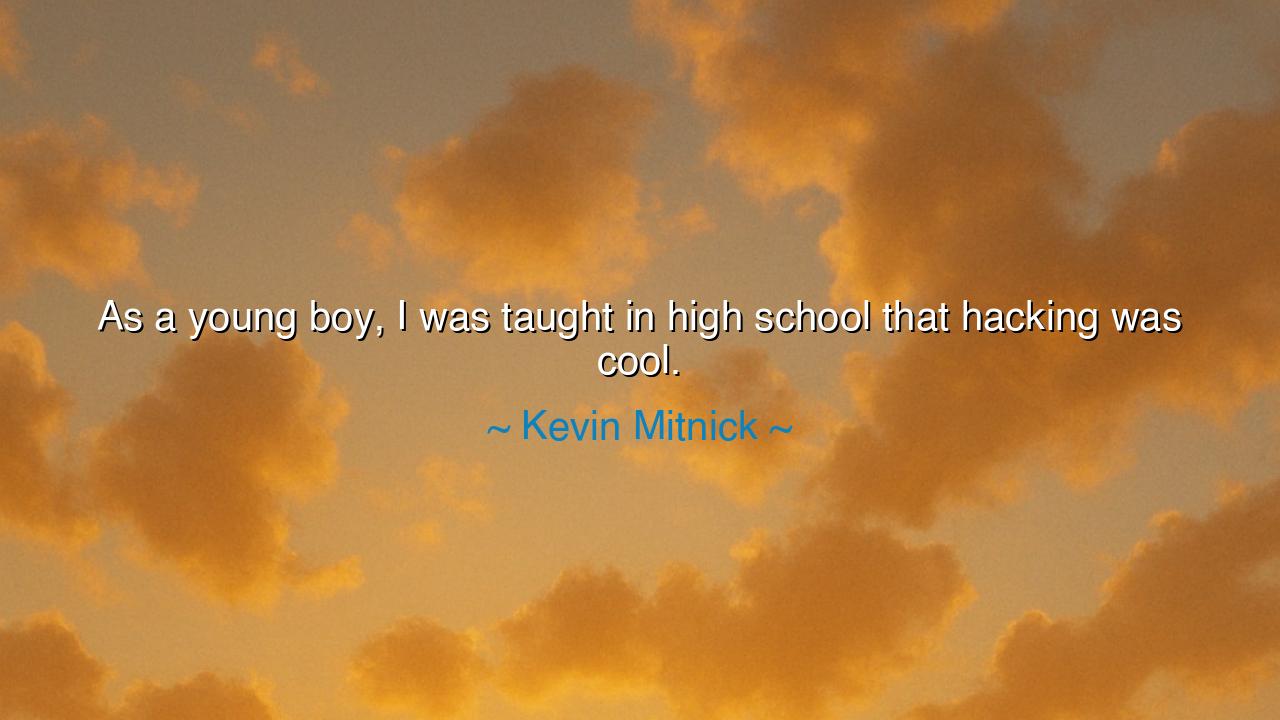
As a young boy, I was taught in high school that hacking was






"As a young boy, I was taught in high school that hacking was cool." These words from Kevin Mitnick reflect a deeper truth about the early formation of identity, the influence of education, and the power of cultural narratives in shaping our values. Mitnick’s admission reveals how, in the formative years of his life, the notion of hacking—of breaking boundaries and challenging systems—was seen not as a crime or act of rebellion, but as an act of skill and coolness. This perspective, though often romanticized, raises important questions about how we view innovation, ethics, and the consequences of actions that push against the established order.
In the ancient world, those who sought to challenge the norms were often both revered and feared. Prometheus, the Titan who defied the will of the gods by giving fire to humanity, is one of the most famous figures to embody this paradox. Prometheus was praised for his foresight and creativity in helping humanity rise above its limitations, yet he also faced immense punishment for his actions. Similarly, Kevin Mitnick—through his hacking—challenged the boundaries of the digital world, testing the limits of what could be done with technology, and thereby embodying the same rebellious spirit that has always accompanied innovation. The question is not simply whether such acts are cool, but whether the consequences of breaking the rules are worth the knowledge gained.
The concept of hacking as an art of skill, as Mitnick describes, is not unlike the philosophers of the ancient world who sought to break away from conventional wisdom and explore new ideas. Socrates, for example, was known for his method of questioning everything—his dialectic method of challenging assumptions and probing the logic behind accepted truths. His aim was not to break the laws of Athens, but to expose the limits of common understanding. In much the same way, Mitnick, though operating in the realm of technology, was essentially a modern-day philosopher, using his skills to explore and question the boundaries of the digital world, but often without the clear ethical framework that guided the philosophers of old.
Yet, as ancient myths remind us, the desire to break boundaries comes with its own cost. In Greek mythology, Icarus flies too close to the sun, using the very freedom of flight to defy the natural limits imposed upon him. He suffers a tragic fall, a reminder that to push the limits of possibility without considering the consequences can lead to unintended destruction. Mitnick's hacking, which was once seen as cool, ultimately led to legal consequences and personal hardships, illustrating that breaking the rules comes with a price. The lesson here is that while innovation and rebellion can drive progress, they must be tempered with wisdom and an understanding of the consequences of one’s actions.
Consider the story of Leonardo da Vinci, who was both an innovator and a rule-breaker in his time. Da Vinci sought to understand the mysteries of the world—anatomy, engineering, and mechanics—through experimentation and observation, often challenging accepted doctrines. However, unlike Mitnick, da Vinci’s exploration of knowledge was grounded in a desire to improve and enrich humanity, not just to break systems for the sake of it. His life shows us that true innovation requires not only skill but a purpose and a vision that serves the greater good. Innovation for innovation’s sake can be thrilling, but it must also be rooted in a sense of responsibility.
The lesson from Mitnick's words, and from the lessons of the ancients, is that knowledge and innovation must be approached with a sense of ethics and responsibility. To be a rebel is to question the established order, but it is important to understand the potential consequences of such rebellion. The coolness of defiance should not blind us to the dangers that accompany it. Like Socrates or Prometheus, we must weigh the benefits of breaking boundaries with the risks involved in doing so. True innovation comes not just from disruption, but from using one’s talents and skills in ways that contribute to the well-being and advancement of society.
The actionable lesson is to approach innovation with both boldness and wisdom. Challenge the norms, but do so with the understanding that every action has a reaction, and every choice brings with it a responsibility. Like Mitnick, we can use our skills to explore and push boundaries, but we must be aware of the larger impact of our actions. To be truly revolutionary, we must not only break new ground but do so in a way that enriches the world and does not undermine it. The future belongs to those who dare to think differently, but it also requires those who think deeply about the path they take.






AAdministratorAdministrator
Welcome, honored guests. Please leave a comment, we will respond soon